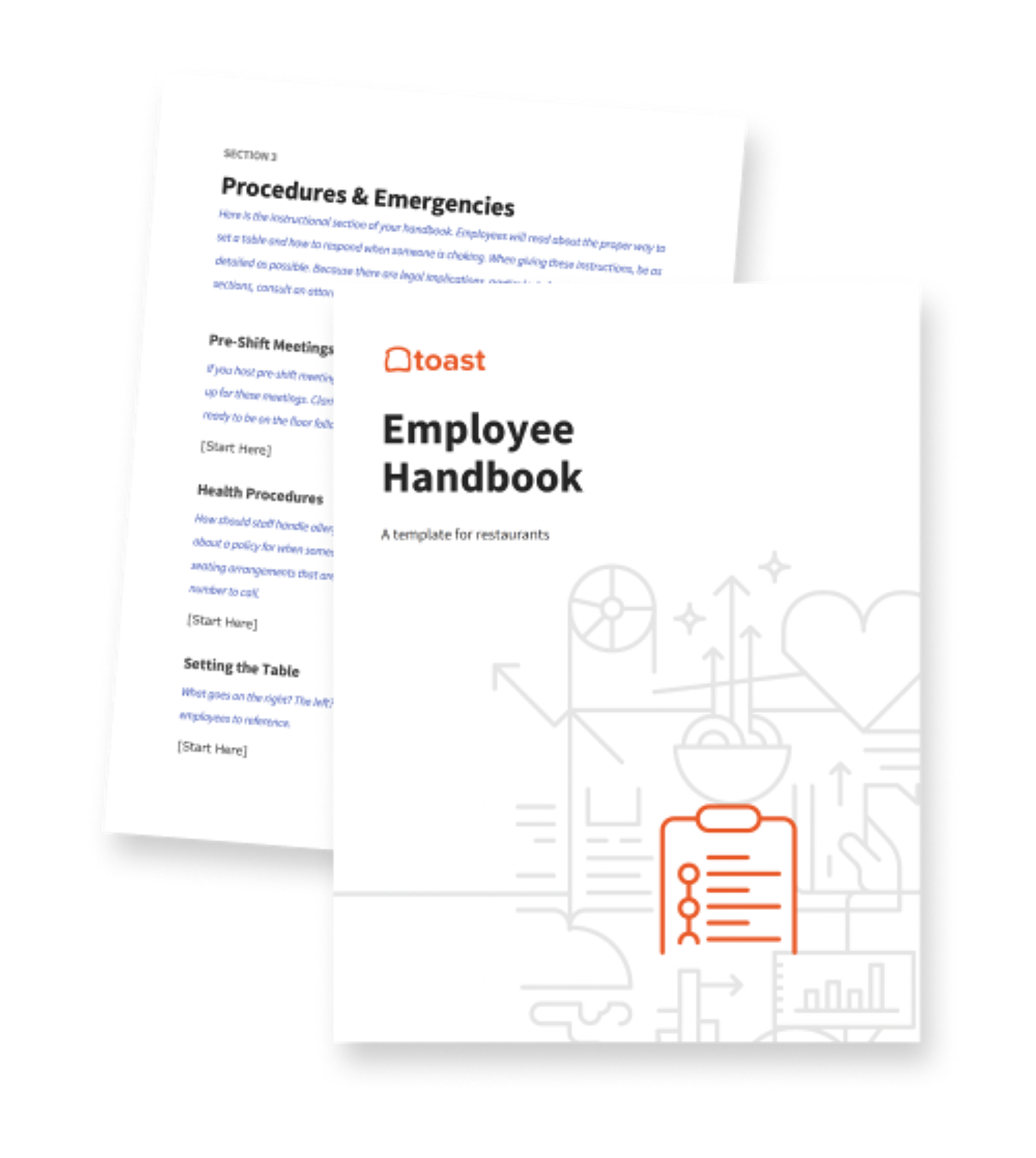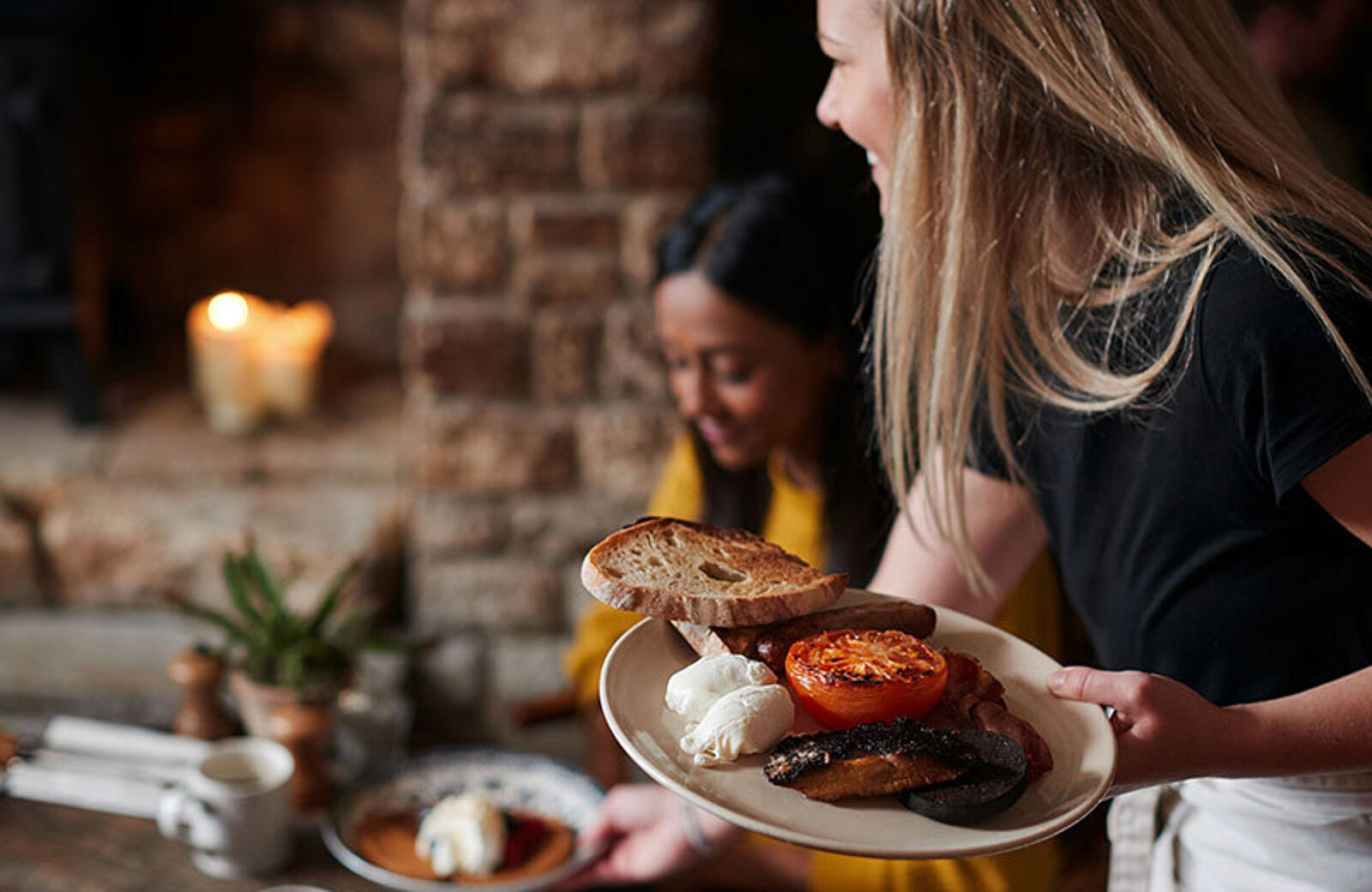
Rally Your Team Around Core Values
Your restaurant is a voice in the community it serves. And your team is paying attention to it.

Nick PerryAuthor


Employee Handbook Template
Outline your restaurant’s staff policies in this customizable Word doc to help restaurant management and staff get on the same page.
Get free downloadThe culture in restaurants has been widely debated during the past decade, but it’s faced particular heat in recent years related to how culture has affected our ability to hire and retain staff – a major operational challenge restaurant owners and operators are facing right now.
Safe workplace environments, career growth, compensation, and evolving global issues like climate change, sexual harassment, diversity and equity, and the direction of the economy are increasingly part of the conversation about work.
Today’s restaurant workers are more concerned about the impact of their choices on these external issues. Nearly 9 out of 10 millennials (those between the ages of 22 and 37) would consider taking a pay cut to work at a company whose mission and values align with their own, according to LinkedIn’s Workplace Culture report.
This means restaurant employers today need their businesses to have strong cultural values to have any chance of hiring and retaining great staff.
Employee Handbook Template
Outline your restaurant’s staff policies in this customizable Word doc to help restaurant management and staff get on the same page.

The Difference Between Brand, Culture, and Values
Your restaurant’s core values are what you care about. They define your business, well, to its core. Values define how your actions positively impact your staff, your customers, and your community. Core values act as your business' compass, guiding all business decisions, including hiring, menu adjustments, marketing, and management style.
Establishing your restaurant’s core values is not something to be taken lightly.
Your brand, on the other hand, is how you want your guests to feel about you. If developed properly, your restaurant’s brand should act like a magnet, drawing in guests (and staff members) who support or identify positively with what you’re all about, whether it’s the way you source your food, the design of your guest experience, or whether you partner with local charities. It’s more of an emotional thing.
And third, a restaurant’s culture is the set of behaviors and norms exhibited by those who work there. It’s a living element of your restaurant’s operations that must be carefully cultivated every single day.
To bring it all together, your restaurant’s values should be visible in both your restaurant’s brand and culture. Failure to build a brand that mirrors your core values is one reason many restaurants fail. And with more competition entering the market every year, it’s critical to get your core values fleshed out and integrated into your culture.
The Ultimate Guide to Restaurant Branding
Use this guide to get tips on how to create a restaurant brand that stands out, attracts customers, and drives repeat visits.

Why Your Restaurant Needs Core Values
Many restaurants focus on the mechanics of service or hiring a talented chef. Those are necessary to running a restaurant, sure. But if you want to thrive and not just survive in the restaurant industry, establishing strong core values when opening a restaurant will give you an edge over the competition.
Core values support the vision of what you hope to accomplish as a restaurateur. For example, if one of your core values is to stand behind the quality of your products, any product that doesn’t meet your standards is automatically not served. Your culinary and service teams will live this value and refuse to serve substandard food to guests.
Openly communicating strong values will help you educate potential and existing staff and customers about what your brand stands for.
Take a look at Danny Meyer and Union Square Hospitality Group. Danny and his team are renowned for their mission, vision, and values. Danny goes out of his way to educate and inform the public of his company’s core values, highlighting the intrinsic role they play in USHG’s approach to restaurant management and operations.
Core values also become a great recruiting and retention tool. Living your core values aloud, both inside and outside the workplace, will attract like-minded candidates and will help you determine who is and isn’t an addition to your culture during the interview process.
Erin Wade, owner of mac and cheese restaurant Homeroom, in Oakland, CA, believes living their values aloud is just one critical aspect of building a strong team culture. She holds a weekly meeting at their restaurant where management discusses the restaurant’s finances and progress with the staff, but that’s only the beginning. “We're a mission-driven company that talks about our values and our purpose at work, because that's really what makes work interesting and exciting every day.”
“We're a mission-driven company that talks about our values and our purpose at work, because that's really what makes work interesting and exciting every day.”
Erin Wade
Owner of Homeroom
How to Decide on Your Restaurant's Core Values
Core values are not a one-size-fits-all kind of thing. Some restaurants make the mistake of choosing core values and trying to make them fit into their organization when really the opposite is true: You need to choose your core values, and then shape your business around them.
Culture flows down, not up. It starts with leadership. Since core values play such an intrinsic part in the shaping of culture, core values must first pass the leadership snuff test. As a restaurant owner or operator, you’re the values gatekeeper — they have to resonate with you first.
Core values only work when every member of a restaurant’s staff — most notably, leadership — live them instead of just talk about them. They have to mean something to you. They have to be something you strive for.
Here's a quick, easy exercise to help you develop your restaurant’s core values.
1. Write a list of your personal values.
This can include things like:
- Community
- Family
- Charity/volunteerism
- Authenticity
- Supporting the local economy
- Honesty
- Integrity
- Hospitality
- Creativity
- Dependability
- Adaptability
- Quality
- Consistency
- Teamwork
- Credibility
- Respect
Write a list of about 20–40 core values that come into your head without too much thought.
2. Let that list sit for a couple days. Then review it with a critical eye.
Review the list and start highlighting the values that stir a reaction from you.
You should end up with about a dozen or so values left on your list. During the next week, spend time thinking about how these values relate to your vision for your business, and whittle away any that don’t truly strike you at your core.
3. Get feedback from those you trust.
Bring this list of values to the managers, leaders, and staff you trust within your business. This could be the server who’s been with you for five plus years or the investor who gave you the cash to get your dream off the ground. Get their initial reactions and give them time to consider your values and come back to you with feedback, questions, and recommendations of their favorites.
After evaluating their feedback and selecting your favorites, you should be left with a list of 3-7 core values for your restaurant business. And there you have it.
Next comes the communication tour.
One-on-One Meeting Template
Make weekly, biweekly, or monthly check-ins with employees productive with this customizable Word doc for your one-on-one meeting agendas.

How to Adopt Core Values Into Your Team Culture
One of the most important roles as a restaurant owner or operator is to teach and preach your company's core values every single day.
Remember when we referred to your restaurant’s core values as a decision-making compass? That extends to your staff as well. Your core values should be used by management and staff in both front-of-house, back-of-house, and back office to guide their actions and overall workplace behavior.
The more strongly defined the core values, the more likely this value system will serve as a code of conduct for all, promoting and guiding strategically aligned behaviors that reinforce your brand identity.
But to do that, you’ve gotta get everyone bought in.
After you create your list, type up your core values and prominently display them across your store room, your staff communications, your employee handbook, and your website so that staff (and customers) can be reminded of what truly inspires and drives your restaurant.
SuViche, a modern Peruvian ceviche and sushi restaurant in Miami, FL, and a Toast customer, proudly displays their team’s principles on their website. Their values include things like continuous improvement, openness, and initiative, and they explain what each means with definitions.
Then schedule several communication sessions to explain to your team what the values are and why you chose them. Walk them through your thought process and give them clear examples of how your values come to life. If you can call out particularly successful staff for how they’ve embodied your new values, even better.
Remind your team that their opinions are important, so ask them to come to you with questions and feedback on these new values. They can do this in-person, through email, or you could set up an anonymous Google Survey. Make changes to the values if you receive feedback that warrants it, and communicate these changes openly to your crew.
Continue to teach and show your core values every chance you get — throughout staff training, in job descriptions, in pre-shift meetings, and just about everywhere else. Remind yourself of them every morning before heading into work to make sure you’re continuing to live them.
Strong values can help in decision-making. They can clarify vision. They can tell the story of where you want to go and why. They can drive new business. And they can motivate the heck out of your staff. Because we all want to be part of something with purpose.
Related Restaurant Operations Resources
Is this article helpful?
DISCLAIMER: This information is provided for general informational purposes only, and publication does not constitute an endorsement. Toast does not warrant the accuracy or completeness of any information, text, graphics, links, or other items contained within this content. Toast does not guarantee you will achieve any specific results if you follow any advice herein. It may be advisable for you to consult with a professional such as a lawyer, accountant, or business advisor for advice specific to your situation.
Read More
Subscribe to On the Line
Sign up to get industry intel, advice, tools, and honest takes from real people tackling their restaurants’ greatest challenges.






